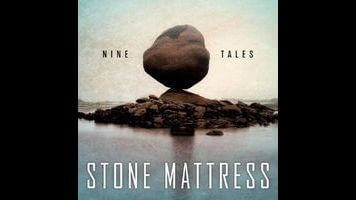
In the title story of Margaret Atwood’s collection Stone Mattress, a senior citizen contemplates killing a man who brutally raped her when she was 14. Verna Pritchard wonders whether it’s worth the trouble, “because face it, she is an old woman now—on the verge of murdering an even older man because of an anger already fading into the distance of used-up time.” The rape destroyed her confidence, her reproductive system, and her life, but she still questions her right to even resent her attacker when she encounters him again: “How Paleolithic to still feel wounded by any of it,” she thinks. And yet her self-effacing instinct to discount her humiliation and decades of recovery (not entirely successful, judging by her horrifying matrimonial habits) don’t get in her way when it comes time to act decisively. Her intellect tells her the trauma is long over. Her emotions—less thoroughly examined, but more significant in the moment—say otherwise.
That’s often true in Atwood’s writing, which tends to be beautifully mannered and precise as its characters think things through in bloodless detail, then act according to hidden desires rather than their own well-presented reasoning. “Stone Mattress” provides a title and a natural central metaphor for this collection, in the form of algae-based fossils called stromatolites. (“Stone mattress” is a literal translation of its linguistic root words.) Stromatolites accrete slowly, in thin layers, over long eras. Like Verna, many other characters in these stories are late in life, looking back toward old traumas, papered over by decades of other events. The theme isn’t heavily underlined, but it’s enough of a backbone to make these otherwise disparate, mostly new stories hold together.
This theme comes through clearly in the opening three-story arc, which looks at an explosive college relationship through the eyes of three querulous seniors: “Alphinland” centers on a hugely successful fantasy writer, “Revenant” spends time with the successful poet who was her first real passion, and “Dark Lady” explores a woman who complicated their relationship. After long creative careers and other, more defining contacts, they’re all still poisoned by a bedroom betrayal half a century ago. It seems reductive, how thoroughly they’re still affected by where two people put their genitals back when they were barely adults. But then again, all three characters are romantics, living in fantasies that save them from the less-pleasant present of infirmity, widowhood, and impotence. They aren’t just caught up in past sexual peccadilloes, they’re caught up in their revisionist history of their own identities.
In the other, unrelated stories, the past is similarly haunting. “The Dead Hand Loves You” catches a fed-up horror writer who at long last has decided to murder the old friends who took the contractual rights to his greatest hit in lieu of rent back in the 1960s. “I Dream Of Zenia,” which revisits characters from Atwood’s Robber Bride, deals with a terrible old romance rekindled, and the memories of a bunch of better romances turned to ash. “Torching The Dusties” has the residents of a nursing home waiting out a siege by a movement dedicated to slaughtering old folks. “The Freeze-Dried Groom” features a storage locker full of long-sidelined wedding accoutrements—including the husband-to-be. “Lusus Naturae” (written for a 2002 Michael Chabon anthology) is the odd duckling of the bunch: It’s a more standard gothic horror, about a family’s secret monster finally ceasing to be a secret.
The major frustration in Stone Mattress is that some of these stories are more ruminative and expansive than others, to the point where a few feel like incomplete novel openings. “Alphinland” in particular is too concerned with the trivia of the author’s day—like the many particulars of a trip to buy salt during a snowstorm—to fully draw any conclusions about her, or the way her dead husband talks to her. “Groom” presents a fascinating setup, then ends abruptly, like a tempting fiction-class writing prompt. “Dead Hand” offers a sort of ending, but it’s unconvincingly flat after the far more expansive storytelling preceding it. It’s certainly appropriate for a collection about long-dormant, festering issues to fail to wrap them all up neatly just because the protagonists have reached their twilight years, but none of these stories are overtly about static characters or situations. When Atwood highlights the chance to do something, even if that’s only coming to an accord with a memory, or even failing to, it’s maddening to step away with the decision still left unmade.
That said, while Atwood generally puts more elaborate, immaculate craft into her novels than her short stories, Stone Mattress never comes across as rushed or ill-considered. Her writing remains balanced between accessible and flowery; she has a long-sustained knack for metaphor-strewn writing that feels carefully considered, but not dense or overworked. There’s an appealing prosaicness to her worlds, which lay out the fantastical bluntly and cleanly. Here, characters mull over murder, and sometimes even commit it, with a Hercule Poirot-esque precision and calm. Other characters craft layers of lies to protect themselves, with similar cool forethought. All these protagonists have aged into similar states of discomfort or self-deception. But Atwood makes them absorbing, and brings an impressive range of characterization and circumstances that disguise the central idea’s similarity throughout the book. Stone mattresses make for restless sleep, but in this elegant collection, everyone expresses that restlessness differently.